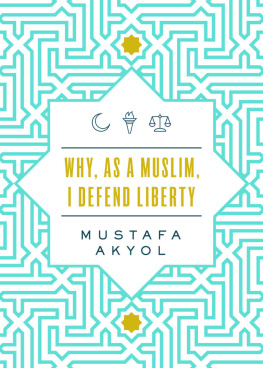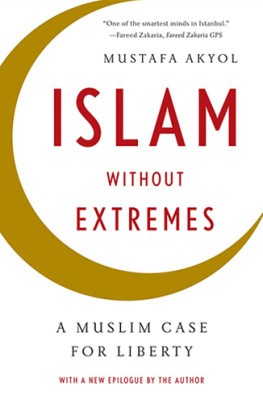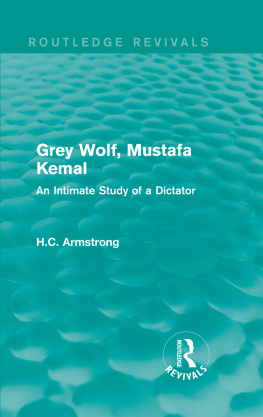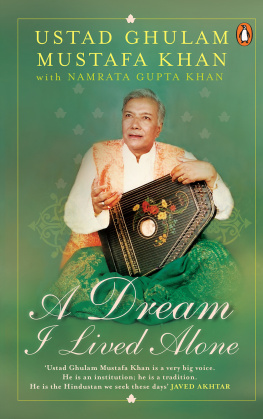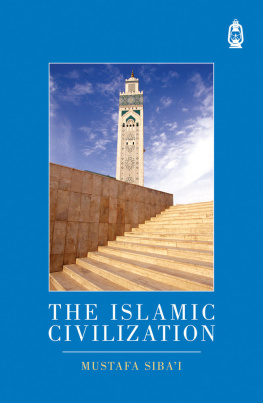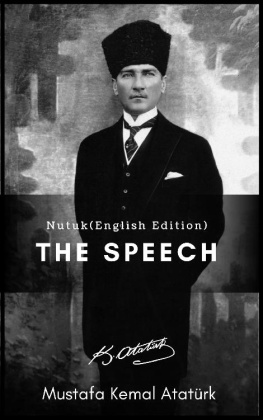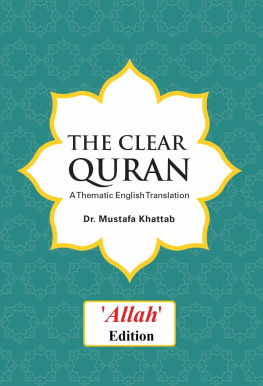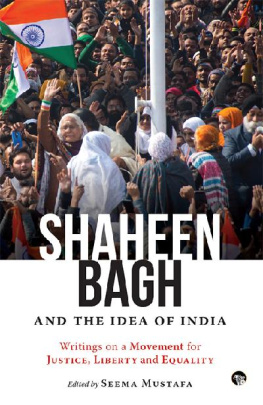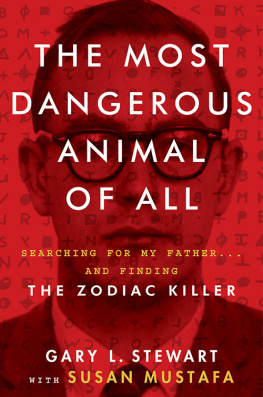Mustafa Akyol - Why, as a Muslim, I Defend Liberty
Here you can read online Mustafa Akyol - Why, as a Muslim, I Defend Liberty full text of the book (entire story) in english for free. Download pdf and epub, get meaning, cover and reviews about this ebook. year: 2021, publisher: Libertarianism.org Press, genre: Religion. Description of the work, (preface) as well as reviews are available. Best literature library LitArk.com created for fans of good reading and offers a wide selection of genres:
Romance novel
Science fiction
Adventure
Detective
Science
History
Home and family
Prose
Art
Politics
Computer
Non-fiction
Religion
Business
Children
Humor
Choose a favorite category and find really read worthwhile books. Enjoy immersion in the world of imagination, feel the emotions of the characters or learn something new for yourself, make an fascinating discovery.
- Book:Why, as a Muslim, I Defend Liberty
- Author:
- Publisher:Libertarianism.org Press
- Genre:
- Year:2021
- Rating:3 / 5
- Favourites:Add to favourites
- Your mark:
- 60
- 1
- 2
- 3
- 4
- 5
Why, as a Muslim, I Defend Liberty: summary, description and annotation
We offer to read an annotation, description, summary or preface (depends on what the author of the book "Why, as a Muslim, I Defend Liberty" wrote himself). If you haven't found the necessary information about the book — write in the comments, we will try to find it.
Why, as a Muslim, I Defend Liberty — read online for free the complete book (whole text) full work
Below is the text of the book, divided by pages. System saving the place of the last page read, allows you to conveniently read the book "Why, as a Muslim, I Defend Liberty" online for free, without having to search again every time where you left off. Put a bookmark, and you can go to the page where you finished reading at any time.
Font size:
Interval:
Bookmark:
Mustafa Akyol
CATO INSTITUTE
WASHINGTON, DC
Copyright 2021 Cato Institute.
All rights reserved.
Print ISBN: 978-1-952223-17-4
eBook ISBN: 978-1-952223-18-1
Library of Congress Cataloging-in-Publication Data available.
Library of Congress Control Number: 2021939010
Cover design: Molly von Borstel, Faceout Studio
Printed in Canada.
CATO INSTITUTE
1000 Massachusetts Avenue NW
Washington, DC 20001
www.cato.org
Dedicated to my lovely little sons, Levent Taha, Efe Rauf, and Danin Murad
Without liberty humans are degraded into instruments.
[So] liberty is the witness of human dignity;
if there is no liberty, there will be no dignity.
Liberty is also the source of all kinds of progress;
if there is no liberty, there will no progress.
Mnif Pasha, Ottoman statesman and intellectual, 1830-1910
To compel individuals to confess a faith creates not a religious society, but a monolithic and terrified mass of crippled, submissive, and hypocritical subjects.
Abdolkarim Soroush, Iranian Islamic philosopher
In January 2013, when I was still living in my hometown, Istanbul, I flew to Riyadh, the Saudi capital, to attend a conference on the politics of the Middle East. The event was interesting, my Saudi hosts were gracious, and it was an experience to visit the kingdom for the second time after an umra (little pilgrimage) to Mecca two years before. But I had the most interesting experience on the Turkish Airlines plane that took me home.
In Riyadh, all women boarded the plane fully covered. To be more specific, all of them wore plain black dresses that covered them from head to toe, showing, at most, only their faces. About half of the women were covered up even more: they were wearing the niqab (face veil), which showed only their eyes. When the plane approached Istanbul, however, I noticed some of these women walk back to the lavatory and emerge dressed in a very different fashion. Now, they were all wearing much more relaxed dressesa few of which were quite revealingalong with heavy makeup. One woman, I can say, was wearing one of the shortest miniskirts I had ever seen. Apparently, she was ready to party in Istanbuls famous nightclubs.
When I viewed this scene, I did not judge those women. One could have blamed them for hypocrisy, but that would be unfair. They were not choosing hypocrisywearing ultraconservative dresses within Saudi Arabia, and something quite different when they stepped outside. Rather, it was imposed on them. The Kingdom of Saudi Arabiawith its rigid religious laws and its notorious religion policewas forcing them to do something they did not want to do.
Moreover, this problem was not limited to Saudi Arabia. The Islamic Republic of Irana bitter rival but also a like-minded counterpartalso dictates that all women wear the headscarf, despite resistance and defiance among them. Similar dictates, either by law or by custom, have also taken place in certain countries of the Arab world, Afghanistan, Pakistan, Malaysia, and Indonesia.
This, of course, does not mean that all women in those countries cover themselves unwillingly. No, not at all. Worldwide, many Muslim women believe that a conservative dress and a head cover are requirements of their religion, which they willingly observe. To assume that they all must be doing this because of the dictates of menor some false consciousness instilled in them by menhas led to contradictory dictates. French authorities, most notably, have banned the Islamic headscarf in public schools and jobs, as well as the burkinia swimsuit that covers the body and the hairon some of their beaches. Similar bans have been issued in Belgium; Quebec, Canada; and even Turkey, which used to adopt an illiberal version of secularism until the early 2010s.
In all the cases mentionedmore severely in Saudi Arabia and Iran, where dictates are much more sweeping and stricterwhat we see is the lack of a value that is crucial for human dignity, happiness, and flourishing: liberty. It is the value I will discuss in this book, in its relation to Islam.
What does liberty mean exactly? The New Oxford American Dictionary defines it as the state of being free within society from oppressive restrictions imposed by authority on ones way of life, behavior, or political views. More briefly, liberty is also defined as the absence of coercive constraint. Such constraints on the individual may come from the government, society, or other individuals. And because the relationship between these three realmsthe state, society, and the individualis a matter of politics, liberty is primarily a political concept.
It is important to make that point clear, because some people may suppress liberty by claiming that they are actually serving some real liberty. For example, the Saudi religious police or Iranian Revolutionary Guards who impose dress codes on women may claim to bring these women liberty from immorality or liberty from Western cultural imperialism.
Conversely, an atheist dictatorship may close down all churches and mosques by claiming to bring liberty from superstitionwhich is exactly what happened in Albania during the communist regime of Enver Hoxha (19411985). That regime vowed to liberate people from religious beliefs and backward customs.
In other words, there may be regimes, groups, or individuals in the world who attack our liberty in order to serve some higher good that they themselves have chosen for us. We, obviously, should not be misled by their pretense.
An important thinker who stressed this point was John Stuart Mill, a 19th-century British philosopher. In his landmark 1859 book, On Liberty, he wrote the following:
The only purpose for which power can be rightfully exercised over any member of a civilized community, against his will, is to prevent harm to others. His own good, either physical or moral, is not a sufficient warrant.
Mill was one of architects of the political philosophy called liberalism, which was born in early modern Europe with an emphasis on individual liberty, consent of the governed, and equality before the law. Some of its advocatesincluding Millhad Eurocentric biases and double standards, which was then common, but liberalism matured over time, championing universal human rights, for everyone, everywhere. It was also adopted by many non-Westerners, including Muslims, who promoted liberal values in their societies, for the sake of those societiesan important point to which I will return later in this book.
Variants and nuances of liberalism, and their implications in real life, are endlessly discussed by political theorists and public intellectuals. Also, the term has taken slightly different meanings in different contextsimplying often classical liberalism in Europe, which is what I am talking about here, while implying a center-left progressivism in America, where the term libertarianism emerged as a helpful clarification. And even those who define themselves as liberal or libertarian may disagree on how these ideas must be applied to specific cases.
All those nuances and complications of liberalism, however, are not my focus in this book. My focus is whether its core valueliberty, in the sense of the absence of coercive constraintis compatible with Islam.
In a nutshell, here is my argument:
First, liberty is compatible with Islamif it is understood as a voluntary faith, and not a coercive system. That is because Islam, at its core, rests on the sincere relationship between God and the individual, which can exist only in a medium of freedom, not coercion. The latter, as I observed on my RiyadhIstanbul flight, can create only hypocrisy, not piety.
Font size:
Interval:
Bookmark:
Similar books «Why, as a Muslim, I Defend Liberty»
Look at similar books to Why, as a Muslim, I Defend Liberty. We have selected literature similar in name and meaning in the hope of providing readers with more options to find new, interesting, not yet read works.
Discussion, reviews of the book Why, as a Muslim, I Defend Liberty and just readers' own opinions. Leave your comments, write what you think about the work, its meaning or the main characters. Specify what exactly you liked and what you didn't like, and why you think so.

